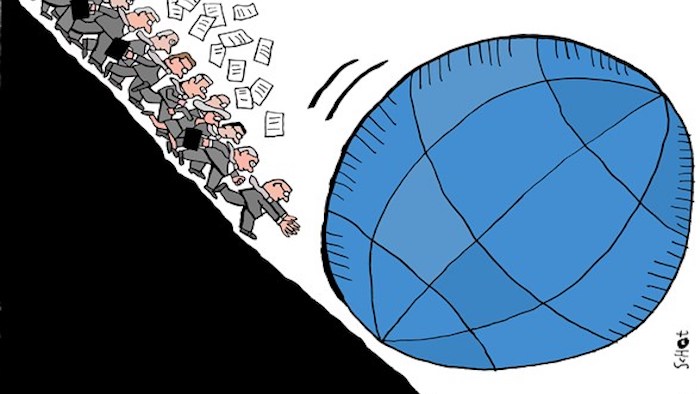The largest pavilion in Hall E for national delegations at COP24 belonged to the European Union. Those of Austria, Benelux, France, Germany and the UK – EU member states – were the most striking.
It’s clear that Europe has a key role to play in the fight against climate change. The EU has undertaken important measures since 2008, with the “20-20-20 objectives” (20% less greenhouse gas emissions, 20% renewable energy and 20% more energy efficiency) for 2020.
The United States want to do their own thing, since climate sceptic Donald Trump took power. Canada, despite prime minister Justin Trudeau’s grandiose claims at his inauguration, doesn’t seem likely to abandon the Keystone XL pipeline project involving oil-sand refining.
Emerging and developing countries cannot be the leading voices for change: for too long already they’ve been the victims of climate inequalities, and their carbon footprint per capita remains well below that of western countries. Elsewhere, the new president of Brazil, Jair Bolsonaro, is taking cues from Donald Trump by questioning the validity of the fight against global warming. The Brazilian delegation even threatened to derail the final accord. China, despite lukewarm efforts to follow the global movement against climate change, wants others to carry the burden. Turkey delayed matters, insisting that they be classed among developing countries in order to benefit from aid.
Minimum service for COP24
COP24 has certainly produced an historic compromise on the implementation of the Paris accord. But NGOs are sounding the alarm, recalling that these efforts will only limit global warming to 3.2°C by 2100, while the IPCC calls for 1.5°C to avoid catastrophe. Climate Action Network were demonstrating at the entrance of the purpose-built complex, awarding Fossils of The Day, with imagery from Jurassic Park, to the worst players in the fight against climate change. Nobody was spared: not the Gulf States for their relentless exploitation of petrol, nor Australia which is keen on pursuing the exploration of coal deposits, nor even European countries like Switzerland, Germany, or the host country, Poland.
In other regards, there was a certain clumsiness on the part of the hosts: the carbon footprint of the menu was rather large; the stand for the city of Katowice included coal, but nobody bothered explaining that it stood for the past. The confusion is understandable, even more so when president Andrzej Duda boasts of Poland’s massive reserves of coal, as inexpensive as it is harmful to the climate.
While they undoubtedly watered down a number of hard problems, Poland deserves credit for adopting the Katowice Rulebook, which will provide concrete guidance to governments in the years to come.
But where were the European leaders?
Another regrettable circumstance: the heavyweights were absent. It’s true that the usual champions of climate justice were there: the former governor of California, Arnold Schwarzenegger, former vice president Al Gore, the secretary of COP21, Laurent Fabius, and António Guterres, general secretary of the UN, under the auspices of which the summit took place. Nevertheless, certain world leaders pulled out at the last minute, and there was a striking lack of European political heavyweights.
Despite announcements in the recent weeks, Angela Merkel and Emmanuel Macron failed to attend, even though the latter has always vaunted his climate credentials. Worse, Macron stayed in France to deal with the “gilets jaunes” (“yellow jackets”), which in part involved abandoning the fuel tax – a blow to France’s efforts to cut greenhouse gas emissions. This turn of events is unfortunately symptomatic of how European goodwill has been crumbling in recent years.
Salvation lies with Europe
And yet, it is indeed with Europe that the earth’s salvation lies. Perhaps not with European countries individually, but with the EU as a whole: the efforts of a single state don’t make all that much sense if they aren’t accompanied by the efforts of other states. While already unloved and blamed by national politicians for every evil (taxes, 3% deficit limit, uncontrollable borders), Brussels has some work to do. The restrictions imposed on the economy to fight global warming need to be implemented at the continental level. Too many differences are currently emerging, on this subject in particular, between Denmark and Sweden on the one hand, and Poland and Bulgaria on the other.
Furthermore, the EU should make a genuine effort to use its political leverage to put pressure on its partners on the issue of global warming. This should start with the United States, which exports to Europe without obliging American businesses to respect the same environmental regulations.
It’s no accident that three of the last four COPs took place on European soil. Our continent is committed to saving the environment. The hope and euphoria which followed COP21 can’t be allowed to be buried, obscured by other present-day worries, such as terrorism or the migrant crisis. The EU urgently needs to prepare a large contingent of political leaders for COP25 in Chile, in order to show how seriously it takes global warming.
Was this article useful? If so we are delighted!
It is freely available because we believe that the right to free and independent information is essential for democracy. But this right is not guaranteed forever, and independence comes at a cost. We need your support in order to continue publishing independent, multilingual news for all Europeans.
Discover our subscription offers and their exclusive benefits and become a member of our community now!












